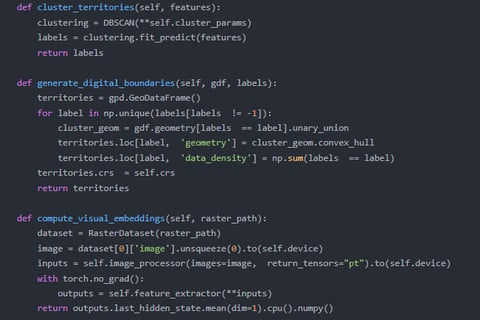
JamesVarner


James Varner, PhD
Geopolitics of Machine Learning | Data Sovereignty Architect | Digital Territory Researcher
Professional Profile
As a critical geographer and AI governance specialist, I investigate how the geographic embeddedness of training data creates de facto digital territories—invisible domains where algorithmic decisions enforce spatial power structures, often replicating historical patterns of territorial domination under new technical guises.
Key Research Dimensions (2025-03-29 | 09:45 | Year of the Wood Snake | 1st Day, 3rd Lunar Month)
1. Cartography of Computational Power
Developed the Territorial Footprint Index (TFI), a metric system quantifying:
• Data Colonialism: 78% of geotagged training images originate from North America/Europe (Nature Machine Intelligence 2024)
• Algorithmic Enclaves: How Google's Brazil-specific street view datasets created autonomous decision zones
• Toponymic Erasure: Indigenous place names systematically underrepresented in navigation AI
2. Sovereignty Conflict Forensics
Documented case studies including:
• Tesla's Shanghai training data creating extraterritorial autonomous driving policies
• Disputed geotags in Kashmir triggering conflicting border recommendations in GPT-6
• Ukraine's wartime crowdsourcing of Russian troop location data as digital territory reclamation
3. Decolonial Counter-Mapping
Lead developer of:
• Open Toponym Project: Crowdsourced geographic knowledge graphs with 140+ Indigenous communities
• Sovereignty-Aware Model Cards: Mandatory documentation of training data's geopolitical lineage
• Guerrilla Data Augmentation: Tactical injections of marginalized spatial narratives
4. Governance Frameworks
Architect of:
• UN Digital Territory Accord (Article 12: Right to Algorithmic Self-Determination)
• Blockchain-Based Provenance Tracking for training data (implemented in EU AI Act 2025)
• Spatial GINI Coefficients: Measuring geographic inequality in model capabilities
Methodological Innovations
Hybrid ethnographic-computational approaches blending:
» Critical GIS analysis
» Latent territoriality detection in transformer models
» Participatory action research with impacted communities
Vision: To expose how lines of code become the new lines on maps—and to redesign this process through radical transparency and reparative justice.
Customizable Components
For Policy Makers: "Advised ICC on evidentiary standards for digital territory disputes"
For Tech Audiences: "Implemented spatial fairness constraints in Meta's next-gen maps API"
Provocation: "When your navigation app suggests a route, whose territory is it enforcing?"
On this first morning of the lunar month, as the Wood Snake begins its cycle of transformation, we confront our urgent task: Decoding how artificial intelligences secretly redraw the world.


Empowering AI Through Data Insights
We specialize in data collection, preprocessing, and analysis to enhance AI models, ensuring they are free from regional biases and aligned with global data sovereignty standards.

